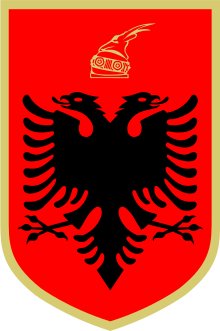Istrian Albanian
Istrian Albanian was a Gheg variety of the Albanian language, which was spoken in the area of Poreč, Istria.[1]
| Part of a series on |
| Albanians |
|---|
 |
| By country |
|
Native Albania · Kosovo Croatia · Greece · Italy · Montenegro · North Macedonia · Serbia Diaspora Australia · Bulgaria · Denmark · Egypt · Finland · Germany · Norway · Romania · South America · Spain · Sweden · Switzerland · Turkey · Ukraine · United Kingdom · United States |
| Culture |
| Architecture · Art · Cuisine · Dance · Dress · Literature · Music · Mythology · Politics · Religion · Symbols · Traditions · Fis |
| Religion |
| Atheism · Irreligion · Christianity (Catholicism · Orthodoxy · Protestantism) · Islam (Sunnism · Bektashism) · Judaism |
| Languages and dialects |
|
Albanian Gheg (Arbanasi · Upper Reka dialect · Istrian) · Tosk (Arbëresh · Arvanitika · Calabria Arbëresh · Cham · Lab) |
| History of Albania |
History
From the 13th to the 17th century due to the depopulation of the Istrian Peninsula, the Republic of Venice repopulated the region with settlers, which among others included Albanians.[2] The coalescence of the various dialects spoken by the settlers led to the formation of the Istrian Albanian dialect. The only surviving text of the dialect was written by the local scholar Pietro Stankovich in the 1830s. Stankovich recorded a version of the Parable of the Prodigal Son and a vocabulary list of the dialect.[3]
References
- "Albanian language - Dialects". Britannica.com Inc. Retrieved 2 March 2012.
- Fine, John Van Antwerp (2006-03-02). When ethnicity did not matter in the Balkans: a study of identity in pre-nationalist Croatia, Dalmatia, and Slavonia in the medieval and early-modern periods. University of Michigan Press. p. 118. ISBN 978-0-472-11414-6. Retrieved 2 March 2012.
- Altimari, Francesco (2011). "Analisi di alcuni manoscritti con testi e lessemi sull' albanese dell' Istria" (PDF). Ludwig Maximilian University of Munich. Archived from the original (PDF) on 13 February 2012. Retrieved 2 March 2012.
This article is issued from Wikipedia. The text is licensed under Creative Commons - Attribution - Sharealike. Additional terms may apply for the media files.